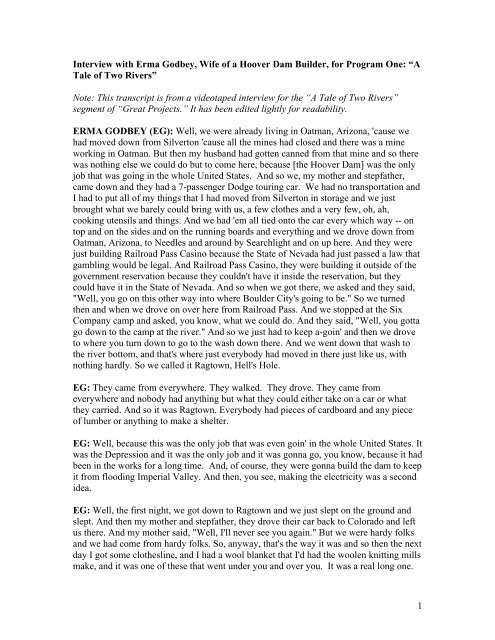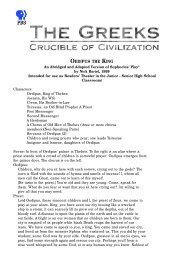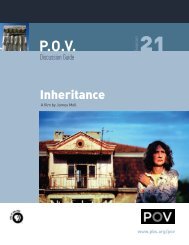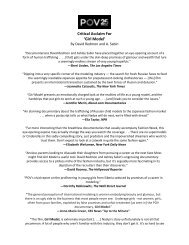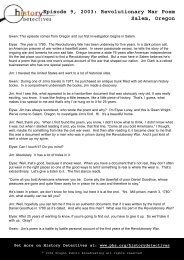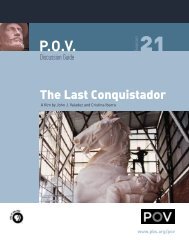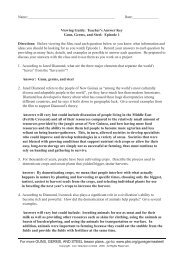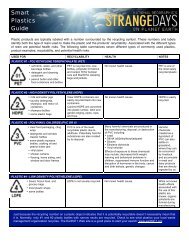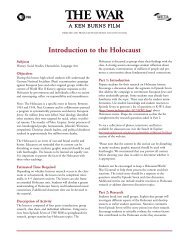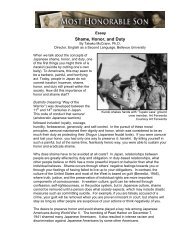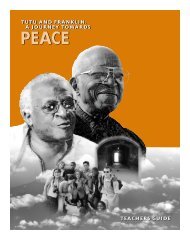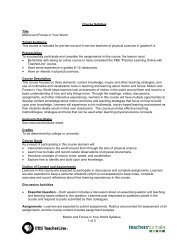1 Interview with Erma Godbey, Wife of a Hoover Dam Builder ... - PBS
1 Interview with Erma Godbey, Wife of a Hoover Dam Builder ... - PBS
1 Interview with Erma Godbey, Wife of a Hoover Dam Builder ... - PBS
You also want an ePaper? Increase the reach of your titles
YUMPU automatically turns print PDFs into web optimized ePapers that Google loves.
<strong>Interview</strong> <strong>with</strong> <strong>Erma</strong> <strong>Godbey</strong>, <strong>Wife</strong> <strong>of</strong> a <strong>Hoover</strong> <strong>Dam</strong> <strong>Builder</strong>, for Program One: “ATale <strong>of</strong> Two Rivers”Note: This transcript is from a videotaped interview for the “A Tale <strong>of</strong> Two Rivers”segment <strong>of</strong> “Great Projects.” It has been edited lightly for readability.ERMA GODBEY (EG): Well, we were already living in Oatman, Arizona, 'cause wehad moved down from Silverton 'cause all the mines had closed and there was a mineworking in Oatman. But then my husband had gotten canned from that mine and so therewas nothing else we could do but to come here, because [the <strong>Hoover</strong> <strong>Dam</strong>] was the onlyjob that was going in the whole United States. And so we, my mother and stepfather,came down and they had a 7-passenger Dodge touring car. We had no transportation andI had to put all <strong>of</strong> my things that I had moved from Silverton in storage and we justbrought what we barely could bring <strong>with</strong> us, a few clothes and a very few, oh, ah,cooking utensils and things. And we had 'em all tied onto the car every which way -- ontop and on the sides and on the running boards and everything and we drove down fromOatman, Arizona, to Needles and around by Searchlight and on up here. And they werejust building Railroad Pass Casino because the State <strong>of</strong> Nevada had just passed a law thatgambling would be legal. And Railroad Pass Casino, they were building it outside <strong>of</strong> thegovernment reservation because they couldn't have it inside the reservation, but theycould have it in the State <strong>of</strong> Nevada. And so when we got there, we asked and they said,"Well, you go on this other way into where Boulder City's going to be." So we turnedthen and when we drove on over here from Railroad Pass. And we stopped at the SixCompany camp and asked, you know, what we could do. And they said, "Well, you gottago down to the camp at the river." And so we just had to keep a-goin' and then we droveto where you turn down to go to the wash down there. And we went down that wash tothe river bottom, and that's where just everybody had moved in there just like us, <strong>with</strong>nothing hardly. So we called it Ragtown, Hell's Hole.EG: They came from everywhere. They walked. They drove. They came fromeverywhere and nobody had anything but what they could either take on a car or whatthey carried. And so it was Ragtown. Everybody had pieces <strong>of</strong> cardboard and any piece<strong>of</strong> lumber or anything to make a shelter.EG: Well, because this was the only job that was even goin' in the whole United States. Itwas the Depression and it was the only job and it was gonna go, you know, because it hadbeen in the works for a long time. And, <strong>of</strong> course, they were gonna build the dam to keepit from flooding Imperial Valley. And then, you see, making the electricity was a secondidea.EG: Well, the first night, we got down to Ragtown and we just slept on the ground andslept. And then my mother and stepfather, they drove their car back to Colorado and leftus there. And my mother said, "Well, I'll never see you again." But we were hardy folksand we had come from hardy folks. So, anyway, that's the way it was and so then the nextday I got some clothesline, and I had a wool blanket that I'd had the woolen knitting millsmake, and it was one <strong>of</strong> these that went under you and over you. It was a real long one.1
And I had it fastened <strong>with</strong> horse blanket pins to the clothesline rope and poles stuck in theground to try to make a little bit <strong>of</strong> shade, because it was so terribly, terribly hot.EG: By 10 o'clock in the morning it'd be 130 [degrees]. It'd be clear past your 120 thatyour thermometer shown and on up further. And then it'd keep on gettin' hotter until 4o'clock in the afternoon before it started gettin' cooler again.EG: Well, Ragtown was just everybody from everywhere -- livin' the best they could<strong>with</strong> the little teeny bit <strong>of</strong> things they had brought <strong>with</strong> them. And, you see, it was startedbecause they were going to drill the diversion tunnels to divert the rivers around the base<strong>of</strong> the dam so they could build the dam.EG: I have an idea there was about a thousand there at the time, and they were all inthese just any kind <strong>of</strong> shanties and, you know, <strong>with</strong> no more shade and stuff than I hadand cookin' on campfires or whatever.EG: Oh, absolutely. You bet I had my children <strong>with</strong> me. I had four, Torn and Jim andLaura and then Ila was the baby. She was 5 months old.EG: Oh, yes. We had to stay together. I had been up in Silverton alone while my husbandwas tryin' to get work, you know.EG: Oh, my mother, yes, but her husband, he had a job as city marshal. So that they hadwork back in Silverton.EG: Oh, sure. Well, that's the best way to be is all together. My husband would see thatwe got some food, if he had to steal it.EG: No. No. There was a lot <strong>of</strong> people that had been camped there for pretty near a yearthat had come earlier when the mines and everything had closed back East. Now myhusband's uncle and aunt and a cousin, they had come up to Silverton to try to get workwhen the mines had closed in Oklahoma a whole year before, but they couldn't get workin Silverton either, because they weren't hiring, and so they had been down there campedfor, oh, 6 months maybe waiting for this job to start.EG: Hoping to get a job. And everybody didn't get a job even after they were livin' there.Just as many as they needed, but -- but there was everybody there. There were collegepr<strong>of</strong>essors. There were lawyers and everybody and -- and they didn't know a damnedthing about mining.EG: Everybody was tryin' to work in the tunnels. And he was so anxious that he justjumped <strong>of</strong>f the boat and went into the tunnel too quick and there was a delayed blast inthe tunnel and it went <strong>of</strong>f just as he put his shovel in. And it hit the shovel and the handle<strong>of</strong> the shovel disemboweled him. Well then, all she could do was try to get his remainsback home or bury him in Las Vegas and go back home herself. So then we bought her2
little tent. So then we had a tent. And then I got two dynamite boxes . . . everybody used'em for chairs or they would take 'em apart -- they were dovetailed -- and make a floor oranything <strong>with</strong> 'em. So I got a-hold <strong>of</strong> two dynamite boxes and I put 'em in this little tentand somehow or other, I had brought my ironin' board along. Couldn't iron a t'all, but Ibrought the ironin' board along and I put it across these two [dynamite boxes]. And then Ihad a bench in the tent that about 5 people could sit on, on the ironin' board, see?EG: Well, we had to go to the river to bathe. And you'd hang onto your kids by theirhand and you wash up underneath their clothes and everything -- nobody showedthemselves. We would stand in the edge <strong>of</strong> the river and wash. And I almost lost Ila oneday. I was hangin' onto her by her leg. I yelled for her dad and he grabbed her, becauseshe was slippin' outta my hand and I was washin' the other kids.EG: Why did I leave? I'll tell you why I left Ragtown, was on account <strong>of</strong> there werethree women died right around me. On the 26th day <strong>of</strong> July, three women died rightaround me and they -- they took -- well, there were four that died. The first three, they gotthem takin' the bodies into the Las Vegas to the mortuary, or wherever, and this otherwoman was just three tents from me. And she had a big dog and she was sick -- they werefrom New York -- and her husband was on the afternoon shift in the tunnels and she wasso hot, she had sent the dog <strong>with</strong> a note on his collar to Mr. Williams, who was the head<strong>of</strong> Williamsville [Ragtown]. He was the ranger. And to ask him if he would come andtake her to the river so she could get cooled <strong>of</strong>f. Well, anyway, when the dog found Mr.Williams and he went and he found her dead. And she was layin' cross the bed. Well,then he told some <strong>of</strong> us women that were close by and we went over and we lifted her upand put her in the bed, laid her down, and he, the ranger, went down to the tunnels to gether husband out <strong>of</strong> the tunnels to come home. And so when the husband came home, hejumped straddle <strong>of</strong> her and he starts to give her artificial respiration. Well, she hadprobably been dead an hour by then. So, <strong>of</strong> course, that didn't do very much good. Andthen he just turned real quick to some <strong>of</strong> us, we three women that were there, and he said,“Anybody want to buy a fur coat?” And we thought, “Oh, my God, in this heat?” Andnone <strong>of</strong> us had any money anyhow. He said, "You want to go to Alaska?" And wethought, “The man's gone crazy.” But I'll tell you what, later on I figured what he wastryin' to do was sell her fur coat that they had brought <strong>with</strong> 'em from New York so's thathe could bury her. I went back to my tent and I told my husband, I said, “We've gotta getout <strong>of</strong> here. I can't stay here any longer. I've got to get somewhere where I can get adoctor if we need one.” And so we went to Cowboy Bill's camp in Las Vegas.EG: Well, I was worried about my children 'cause we couldn't get a doctor or anythingcloser than Las Vegas, you see. And I didn't want us to die like this woman did, like thesewomen did. And so we went into Cowboy Bill's camp in Las Vegas.EG: Simms Ely? Yes, I remember him very well. [Simms was appointed Mayor <strong>of</strong>Boulder City by the U.S. Bureau <strong>of</strong> Reclamation.]EG: I tell ya', anybody that crossed him, why, they got a floater out <strong>of</strong> town. There mightbe one woman maybe was letting her washing machine water run out and it would run3
into another woman's yard and that other woman would fuss to Simms Ely about thewater runnin' into her yard. And he might tell the people whose water ran into the otherone's yard that they had to move. And he'd kick 'em out <strong>of</strong> town. He ruled <strong>with</strong> an ironfist. Anybody didn't cross Simms Ely.EG: His job was protected by his son, and his son was working for the Bureau <strong>of</strong>Reclamation. And if anybody wrote anything in to the Bureau <strong>of</strong> Reclamation aboutSimms Ely, his son got the letter and then Simms Ely knew you wrote and then you'd getkicked out <strong>of</strong> town by Simms Ely!EG: Well, everything was very, very hard because it was so terribly hot and no matterwhat kind <strong>of</strong> a job you were on, you had to contend <strong>with</strong> the heat. Now TurnerConstruction, they finally decided that they would have two groups <strong>of</strong> men working onthe road to the dam and one group would go to work at 4 in the morning and work tillnoon. Nobody would work from noon until 4 o'clock. Then another group would go andwork from 4 o'clock until midnight and they would use -- they had big, oh, ah, you know,lights that they worked by when it got dark. But -- but nobody could work -- the menwere passin' out <strong>with</strong> the heat. But then they found out that, you see, you were sweatin'out all your salt. Then they started givin' everybody salt tablets. Any time you could gethurt and any time you could pass out <strong>with</strong> the heat. Now he used to go to work on thatjob at 4 in the morning and come home at noon.EG: I was worried about him when he was at work and I was worried about the heat,'cause, you see, he couldn't get sleep, except we'd wrap in the wet, wet things. And I’dtake a dishpan when he got home to be <strong>with</strong> the children, I would take it and I wouldwalk down to the store that Merl Emery had, and I would get 15 cents worth <strong>of</strong> ice and Iwould walk back. And that was a quarter <strong>of</strong> a mile from the store to our tent. And thenwe would have a drink <strong>of</strong> cold water and maybe lemonade, one cold drink <strong>of</strong> water in 24hours.EG: My husband made $4 a day.EG: Well, gosh, yes, we were happy to get anything! When you'd been out <strong>of</strong> work aslong as we'd been out <strong>of</strong> work, why, you were glad to get anything.EG: Oh, not until later, when we lived in the railroad Y. When we came back from LasVegas, we lived in the railroad Y and there was a young boy who lived closed to us. Andone day he came over and he said, "Mrs. <strong>Godbey</strong>, would you like to go and see where thedam is going to be?" And I said, "Sure." And he said, "Well, I'll carry the baby." And sowe went down and we walked all through just on the rocks, you know, through wherethey have all <strong>of</strong> the wiring now, you know, where they bring the electricity and then sendit out everywhere. But that was all just -- just bare rocks there. And we went over andthey had white spots painted on each side <strong>of</strong> the canyon wall, round white spots, wherethe dam was going to abutt to the canyon wall. And we looked over and saw that and Iscraped on a rock, <strong>with</strong> another rock, my Ila, that she was a baby just -- well, she wasabout 7 months old by then, see.4
EG: Six Companies really wanted to have [Boulder City] built so they'd have a place fortheir people, the government and Six Companies both, for their people that were workingfor them, but, you see, due to the Depression, people came before they were ready. Butthey had really planned on having the town pretty well built so they'd have places for thepeople to stay.EG: They started working because everybody was out <strong>of</strong> work and they wanted to workand they were already here before they were able to get the housing built. But they hadplanned on building the housing so's that they wouldn't be in a mess like that, but it was'cause there was no other work in the whole United States.EG: I just wish my husband could be alive now and see all the new housing that hasgone on in Boulder City and all the beautiful homes that are here, because after the damwas finished, they thought the town would go to pot. But by that time the Bureau <strong>of</strong>Mines had come in and started and there was enough -- so some <strong>of</strong> the people stayed andthen there were jobs in Las Vegas that some <strong>of</strong> the people that stayed in Boulder workedin Las Vegas.EG: I feel pride and I feel, "God, this is a marvelous job they did." And I think <strong>of</strong> all themen that worked on it and all <strong>of</strong> the figuring and everything that they did to do it,because, you see, now after they got the water diverted into the diversion tunnels andaround the base <strong>of</strong> the dam, then they still had to dig down till they got to bedrock, whichwas about 100 or more feet deeper, until they could get good solid footing to put the dam.And then, you see, whenever there was any place that it was leakin' around through themountains, why they grouted that.EG: Well, I certainly do feel pride when I look at Boulder <strong>Dam</strong> and know all <strong>of</strong> the menthat had worked on it.EG: Oh, the 31ers, we're dyin' out. [The 31ers were the first to arrive at the site, in 1931.]There's very few <strong>of</strong> us left. There might be several men left, but very, very few <strong>of</strong> thewomen are left, because men came ahead <strong>of</strong> their wives and didn't bring their wives untilafter they got a job. You know, they left their wives and children back home, a lot <strong>of</strong> 'em.EG: We call it the 31ers Club and we get together every year and have a dinner. Oh, itwas very -- it was wonderful.EG: President Roosevelt came and by that time we had our school started and we had alittle orchestra at the school. And my oldest son, Tommy, he played violin. And they hadthe kids, the school kids played a piece or two for President Roosevelt at the dedication<strong>of</strong> the dam, and I was very, very proud <strong>of</strong> that.EG: Oh, he did. Now I want to tell you, my husband -- we leased 40 acres below townand we had a ranch, the only ranch that has ever been here. It's now where the airport isand everything. And, <strong>of</strong> course, he always fussed and if our cows'd get up into town, he'd5
aise holy hell. But one time, one <strong>of</strong> our cows got up into town and he called us to get itback down, and then when my husband went to get it, why, old Simms was watchin’ it,too, and all <strong>of</strong> the school kids were watchin' the cow. And, you see, a lot <strong>of</strong> the kids thathad come from cities and everything, they'd never even seen a cow. And he didn't realizethat. And when he realized that some <strong>of</strong> these school kids had never even seen a cow,why, he wanted us to leave the cow long enough till the kids went back to school andthen we had to get the cow back where it belonged.EG: There were lawyers, doctors, everybody that hadn't committed suicide because <strong>of</strong>tryin' to get a job, any kind <strong>of</strong> a job. And that's the reason that -- that this man went in tooquick and got disemboweled. I don't know what he had done before he came, but theywere in so big a hurry to make their four bucks a day and have some kind <strong>of</strong> money afterthey’d lost everything, that they didn't know anything about mining, you see.EG: Oh, yes, they were -- they were workin' in the tunnels and everywhere just rightalong as -- as common laborers. Yes, sir.EG: My husband was a marvelous man. He was such a good man and everybody lovedhim. I think he was loved by all <strong>of</strong> the children that are my children's age, we were Momand Pop <strong>Godbey</strong> to the whole town because -- then when they started the Legion, then wehad the Sons <strong>of</strong> the Legion and the Daughters <strong>of</strong> the Legion. And he was the father forthe Sons <strong>of</strong> the Legion and I was the mother for the Daughters <strong>of</strong> the American Legion.And, you see, the servicemen got priority for being hired. And so that's why we had somany servicemen in Boulder and we had nearly a thousand men in the American Legionwhen the dam was finished.EG: He did everything. See, how here was the proposition. After we moved into Vegas,any time that he wanted to come in he'd have to quit the job he was on and draw his payin order to bring me any money because they only paid once a month. And he'd have totry to come in once a week to see me and the children. And he'd have to quit his job.Then he'd have to come out and get a job somewhere else. So he worked on all kinds <strong>of</strong>jobs.EG: Well, this is a picture <strong>of</strong> my whole family taken in the 3D-foot pinstock pipe readyto go down to the dam on the 32-wheel trailer.EG: That was Christmas Day, 1934.6


